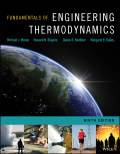
Fundamentals Of Engineering Thermodynamics
9th Edition
ISBN: 9781119391388
Author: MORAN, Michael J., SHAPIRO, Howard N., Boettner, Daisie D., Bailey, Margaret B.
Publisher: Wiley,
expand_more
expand_more
format_list_bulleted
Question
error_outline
This textbook solution is under construction.
Students have asked these similar questions
The pin-connected assembly consists of bronze rods (1) and (2) and steel rod (3). The
bronze rods each have a diameter of 12mm and an elastic modulus of E=120GPa. The
steel rod has a diameter of 18mm and an elastic modulus of E 210 GPa. Assume a=
2.0 m, b=1.5 m, and c = 2.0 m. What is the magnitude of load P that is necessary to
displace point A 5mm to the left?
a
5.52kN
17.05kN
5.05kN
d 6.75kN
Right answer need, no
chatgpt,only handwritten
The pin-connected assembly consists of bronze rods (1) and (2) and steel rod (3). The
bronze rods each have a diameter of 12mm and an elastic modulus of E=120GPa. The
steel rod has a diameter of 18mm and an elastic modulus of E 210 GPa. Assume a=
2.0 m. b = 1.5 m, and c = 2.0 m. What is the magnitude of load P that is necessary to
displace point A 5 mm to the left?
Solution must be in handwritten
format,No Chatgpt
10
5.52kN
b 17.05kN
5.05kN
6.75kN
(3)
Water at 27°C flows with a velocity of 3m/s along a 200mm diameter tube which is
maintained at uniform temperature of 100 °C. What is the local heat flux at x = 4 m from
the leading edge of the tube? Assume fully developed flow, for water: K=0.655 W/mK,
=5.93×10 Ns/m², Pr=3.785
Must be handwritten
a 596.44kW/m2
b 1192.88kW/m2
C 492.86kW/m2
648.96kW/m²
Knowledge Booster
Similar questions
- Water at 27°C flows with a velocity of 3m/s along a 200mm diameter tube which is maintained at uniform temperature of 100 °C. What is the local heat flux at x=4 m from* the leading edge of the tube? Assume fully developed flow, for water: K=0.655 W/mK, =5.93×10 Ns/m², Pr=3.785 No Chatgpt a 596.44kW/m2 b 1192.88kW/m2 492.86kW/m² d 648.96kW/m²arrow_forwardFind the damping coefficient of system given below. Use k=20kN/m, c=100 N-s/m and m=10kg. 122222 Je 0.3 m 0.3 m 0.6m 0.0402 1 b 0.056 C 0.556arrow_forwardPLEASE SOLVE STEP BY STEP WITHOUT ARTIFICIAL INTELLIGENCE OR CHATGPT SOLVE BY HAND STEP BY STEParrow_forward
- PLEASE SOLVE STEP BY STEP WITHOUT ARTIFICIAL INTELLIGENCE OR CHATGPT SOLVE BY HAND STEP BY STEParrow_forwardPLEASE SOLVE STEP BY STEP WITHOUT ARTIFICIAL INTELLIGENCE OR CHATGPT SOLVE BY HAND STEP BY STEParrow_forwardConsider the bar, shown in Figure 1 that undergoes axial displacement due to both a distributed load and a point force. The bar is of cross-sectional area A = 1.10-3 m², and has a modulus of elasticity E = 100 GPa. 1(x) = 5 kN/m x=0.0 x=2.0 2.0m 10 kN Figure 1: Bar domain with varying distributed forces. a) The general form of the governing equations describing the bar's displacement, u(x), is given by, d (AE du(x)) -) +1(x) = 0. d.x dx What are the accompanying boundary conditions for this bar? b) Using the mesh in Figure 2, form the basis functions associated with element 2 and write the FEM approximation over the element. 1 2 3 1 2 1m 1m Figure 2: Mesh of 2 elements. Elements are numbered with underlines. c) The general form of the element stiffness matrix system, with nodes indexed by i and j, is, AE Uj N;(x)l(x)dx – Ng(0)f(0) ¥ [4]}]{{}}={{{}\(\\+} + {N(2)f(2) = N (0)5() }, (1) 0, respectively. L = (2) where f(2) and f(0) denote the boundary forces at positions x 2 and x Evaluate…arrow_forward
- answer pleasearrow_forwardamination) Question 1 Consider the bar, shown in Figure 1, that undergoes axial displacement due to both a distributed load and a point force. The bar is of cross-sectional area A = 1.103 m2, and has a modulus of elasticity E = 100 GPa. 1(x) = 5 kN/m 10 kN X x=0.0 x=2.0 2.0m Figure 1: Bar domain with varying distributed forces. a) The general form of the governing equations describing the bar's displacement, u(x), is given by, d (AE du(x)) + 1(x) = 0. dx dx What are the accompanying boundary conditions for this bar? MacBook Air a 会 DII F5 F6 F7 F8 80 F3 F4 0/ 20 [8 marksl 8 FOarrow_forwardAnswer Barrow_forward
arrow_back_ios
SEE MORE QUESTIONS
arrow_forward_ios
Recommended textbooks for you
 Elements Of ElectromagneticsMechanical EngineeringISBN:9780190698614Author:Sadiku, Matthew N. O.Publisher:Oxford University Press
Elements Of ElectromagneticsMechanical EngineeringISBN:9780190698614Author:Sadiku, Matthew N. O.Publisher:Oxford University Press Mechanics of Materials (10th Edition)Mechanical EngineeringISBN:9780134319650Author:Russell C. HibbelerPublisher:PEARSON
Mechanics of Materials (10th Edition)Mechanical EngineeringISBN:9780134319650Author:Russell C. HibbelerPublisher:PEARSON Thermodynamics: An Engineering ApproachMechanical EngineeringISBN:9781259822674Author:Yunus A. Cengel Dr., Michael A. BolesPublisher:McGraw-Hill Education
Thermodynamics: An Engineering ApproachMechanical EngineeringISBN:9781259822674Author:Yunus A. Cengel Dr., Michael A. BolesPublisher:McGraw-Hill Education Control Systems EngineeringMechanical EngineeringISBN:9781118170519Author:Norman S. NisePublisher:WILEY
Control Systems EngineeringMechanical EngineeringISBN:9781118170519Author:Norman S. NisePublisher:WILEY Mechanics of Materials (MindTap Course List)Mechanical EngineeringISBN:9781337093347Author:Barry J. Goodno, James M. GerePublisher:Cengage Learning
Mechanics of Materials (MindTap Course List)Mechanical EngineeringISBN:9781337093347Author:Barry J. Goodno, James M. GerePublisher:Cengage Learning Engineering Mechanics: StaticsMechanical EngineeringISBN:9781118807330Author:James L. Meriam, L. G. Kraige, J. N. BoltonPublisher:WILEY
Engineering Mechanics: StaticsMechanical EngineeringISBN:9781118807330Author:James L. Meriam, L. G. Kraige, J. N. BoltonPublisher:WILEY

Elements Of Electromagnetics
Mechanical Engineering
ISBN:9780190698614
Author:Sadiku, Matthew N. O.
Publisher:Oxford University Press

Mechanics of Materials (10th Edition)
Mechanical Engineering
ISBN:9780134319650
Author:Russell C. Hibbeler
Publisher:PEARSON

Thermodynamics: An Engineering Approach
Mechanical Engineering
ISBN:9781259822674
Author:Yunus A. Cengel Dr., Michael A. Boles
Publisher:McGraw-Hill Education

Control Systems Engineering
Mechanical Engineering
ISBN:9781118170519
Author:Norman S. Nise
Publisher:WILEY

Mechanics of Materials (MindTap Course List)
Mechanical Engineering
ISBN:9781337093347
Author:Barry J. Goodno, James M. Gere
Publisher:Cengage Learning

Engineering Mechanics: Statics
Mechanical Engineering
ISBN:9781118807330
Author:James L. Meriam, L. G. Kraige, J. N. Bolton
Publisher:WILEY